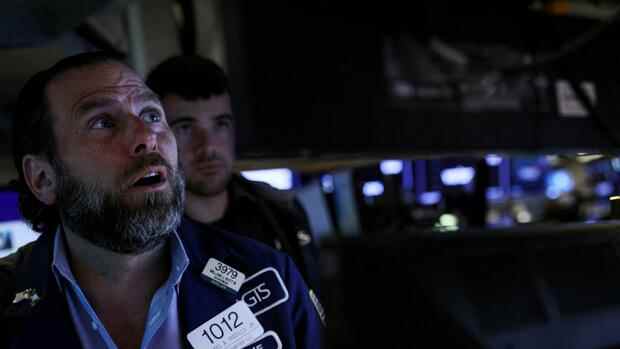Dusseldorf The prospect of an extended series of sharp rate hikes by the Federal Reserve is driving investors out of the US stock market. The US standard value index Dow Jones closed 2.7 percent lower on Friday at 31,392 points. The tech-heavy Nasdaq fell 3.5 percent to 11,340 points. The broad S&P 500 lost 2.9 percent to 3900 points.
These speculations were fueled by the surprising rise in US inflation. According to the information, it was 8.6 percent in May compared to the same period last year. Analysts had only expected an increase of 8.3 percent. “It is becoming increasingly clear that the central bank initiated its monetary policy turnaround too late,” said Commerzbank economist Christoph Balz. “The days of big interest rate hikes of 50 basis points are far from over.”
So far, stockbrokers had hoped that the Fed would slow down the pace of interest rate hikes from September or even take a break. For the Fed meeting in the coming week, a hike of half a percentage point is considered certain. However, investors see an eleven percent probability that the key rate will be raised by 0.75 percentage points.
Alison Boxer, US economist at Pimco, spoke of an unpleasant surprise for the market. “The problem for the US Federal Reserve is not only the extent of the surprise, but also its source. Rental inflation measures, which tend to be consistent with the underlying inflation trend, rose significantly more than expected.”
Top jobs of the day
Find the best jobs now and
be notified by email.
The challenge for the Fed is that there is a long lag between changes in the macroeconomic environment and measuring rental inflation. “Even if economic activity slows significantly and house prices fall and/or unemployment rises, it will take some time for this to be reflected in the CPI,” Boxer said.
Markets are now pricing in more significant rate hikes
Investors are therefore now pricing in more significant interest rate hikes by the US Federal Reserve Bank than before: interest rate hikes by the Fed by 0.5 percent each in June, July and September are now considered likely so that the central banks can regain control of inflation.
Wall Street expert Koch: “The probability of a stronger rate hike is increasing”
Against this backdrop, the dollar index, which tracks the rate against major currencies, rose as much as 0.9 percent to a three-and-a-half-week high of 104.23 points. Government bonds, on the other hand, flew out of the depots. This drove the yield on ten-year T-bonds to 3.717 percent at times. The two-year title returned 3.038 percent, the highest it was 14 years ago.
Technology stocks, among others, came under selling pressure. The shares of Apple, Amazon, Microsoft, Facebook parent Meta and Google parent Alphabet each fell by at least three percent. According to experts, higher interest rates will devalue the future profits of these high-growth companies.
But not only tech stocks, but also financial stocks and cyclicals gave way. The stocks of the major US banks Bank of America, Citigroup and JP Morgan each lost more than three percent because investors fear that rapid interest rate hikes will plunge the US economy into a recession. The shares of the airline Boeing lost five percent.
>> Read about this: ‘It’s a red flag’: Hedge funds bet $250 billion on falling markets
Individual values in focus
Document sign: Shares of the e-signature tech company plunged 24.53 percent after quarterly profit and revenue fell short of Wall Street forecasts. Docusign had previously warned that a return to pre-Covid working conditions could hurt its business.
Stitch fix: Shares fell 18.51 percent after the online clothing maker posted a larger-than-expected quarterly loss and issued a weaker-than-expected sales forecast. Stitch Fix also announced it would cut 330 jobs, about four percent of its total workforce.
Netflix: Netflix slipped 5.1 percent after Goldman Sachs downgraded the stock from “neutral” to “sell” and lowered its price target from $265 to $186 per share. Goldman attributed the downgrade to a number of factors, including a greater focus on profitability and less investor tolerance for long-term investments from such companies. In the same report, Goldman also downgraded video game company Roblox, which fell 4.7% premarket, and Ebay, which fell 3.6%, to sell from neutral.
payment service provider: Companies whose business depends heavily on consumer sentiment came under selling pressure. This fell to its lowest level since the middle of 1980 due to high inflation. Credit card providers such as American Express, Mastercard and Visa then fell by up to 4.1 percent.
tourism: Companies such as American Airlines, the cruise operator Carnival, the hotel chain Marriot or the booking platform Booking.com lost up to 7.6 percent.
With material from Reuters.
More: Why ESG investors are pursuing a high-risk strategy right now
